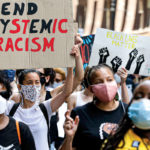When it comes to systems of oppression, discomfort is a given. This is not just because we have been taught to remain silent about these topics and the amount of stigma that inevitably follows, but because we all lend a hand in maintaining and protecting them. The reality is it is nearly impossible to exist and not benefit from some form of privilege while simultaneously perpetuating stigma, harm, and the maintenance of these systems, many of which were built by the following: white supremacy, racism, anti-Semitism, transphobia, etc..
No, this is not always a conscious effort, and yes, it is an uncomfortable truth to sit with. But this is necessary. Regardless of our intent, it is our impact we must be mindful of.
Even when we may have the best intentions, if our impact is negative, we need to put our egos aside, welcome criticism, and commit to an active education and the pursuit of doing better. Most importantly, we need to let down our defenses and listen. And as a society, as well as individuals, we fail to do this all too often.
For instance, as a young Black, Jewish woman who struggles with mental illness, there are a lot of obstacles specifically designed so I will not succeed. And as a light skinned, middle-class, cisgender, straight woman who does not have any physical disabilities, I am afforded a great deal of privilege and access to spaces that are designed to exclude others. Yes, I may be actively trying to do better and elevate the voices and experiences of those around me who have been silenced, but it does not erase the privilege I hold.
And as much as I wanted to believe I was doing enough and choosing the right things, I needed to hold space for the truth: certain movements are NOT about me and it is selfish to center myself and my emotions. This does not mean I am not a kind person, or that you are not a kind person. We are humans, raised in systems that erase our humanity and inspire bigotry. If we are doing something subconsciously, we are not unkind. However, if we learn this, and choose to engage in hatred and ignorance instead, you are not acting kindly.
Helpful Tips:
So here are some tips on how to not just let down defenses and remain grounded during criticisms, but to move forward and act kindly.
Listening:
- Decenter your ego – you can give your ego, intrusive thoughts, or impulsive actions a name. Silently call it out if you feel like it is disrupting the conversation
- Remember what is at stake: HUMAN LIVES
- Understand that you are not entitled to a respectful delivery from BIPoC, members of the LGBTQ+ communities, those who have a physical disability, and more, who have been experiencing this degree of trauma, brutality, and hatred for centuries. THEIR ANGER AND PAIN IS VALID and is notoriously and continuously dismissed. It is not your time to center your comfort and feelings.
- Body language matters – present yourself in a manner that makes others feel heard and important (nod your head, keep eye contact, do not slouch as this signifies you have better things to do with your time)
Responding:
- Actively listen – Before considering a response, be sure you understand and have heard what someone else is telling you. Ask them to repeat something if you did not fully grasp it or hear it. So quickly, we begin cultivating responses, but we do this at the expense of truly listening.
- If you feel yourself becoming activated, pause – take a moment to be mindful of what is happening in your body. Do you feel tense? Are you on edge? Is there anything that you truly need to be protected from? Or is this just guilt? And remember, your guilt is not the priority.
- If you personally offended someone, apologize and then respond in a manner that validates emotions, prioritizes concerns, accepts criticism, and commits to educated action
- e. “I’m sorry, I didn’t realize that this is harmful. Thank you for letting me know. Moving forward, I will be more mindful of what I say and make sure to call others in who make similar mistakes.”


